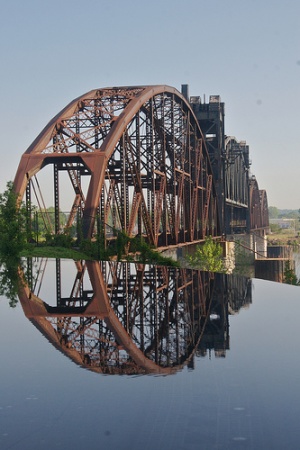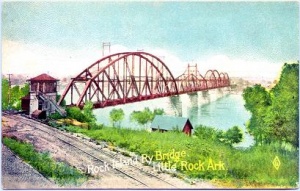Difference between revisions of "Rock Island Railway Bridge"
| (12 intermediate revisions by the same user not shown) | |||
| Line 1: | Line 1: | ||
| − | The '''Rock Island Railway Bridge''' has as its south approach the grounds of the Clinton Presidential Center. | + | [[Image:Clinton_library-09.JPG|thumb|300px|Rock Island Railway Bridge. Photo by James Hyde.]] |
| − | [[ | + | [[Image:Fountain-bridge.jpg|thumb|300px|Rock Island Railway Bridge reflected in Clinton Library fountain. Photo by James Hyde.]] |
| + | [[Image:Rock-island-bridge.jpg|thumb|300px|Postcard of Rock Island Railway Bridge.]] | ||
| + | The '''Rock Island Railway Bridge''', built in 1899 under chief engineer [[F. A. Molitor]], has as its south approach the grounds of the [[Clinton Presidential Center]] in Little Rock, Arkansas. The vertical lift span was added in 1972. | ||
| + | |||
| + | The Rock Island Bridge was constructed by the [[Choctaw and Memphis Railroad]], which received a contract for the bridge on March 21, 1899. The first train crossed the bridge on December 10, 1899. In 1904 ownership of the bridge was transferred to the Chicago, Rock Island, and Pacific Railroad. After the bankruptcy of Rock Island Railroad, the bridge passed into the hands of the [[Union Pacific Railroad]]. The [[City of Little Rock]] acquired the bridge on December 27, 2001. | ||
| + | |||
| + | The bridge is expected to one day connect the North Little Rock and Little Rock parts of the [[Arkansas River Trail]] on the east side of the sister cities. In November 2007 Clinton Foundation spokesperson [[Jordan Johnson]] explained delays to the renovation of the bridge on the grounds of the [[William J. Clinton Presidential Center and Park]]: "No doubt we originally didn't expect it to cost that much. But the price of steel is the main cost factor, along with other aspects we wanted to include to ensure we were going to get it right and have a structure everyone can be proud of." Johnson said that the Foundation had met with officials in Pittsburgh who were pursuing a similar bridge renovation project, and explored the possibility of federal grant programs to fund part of the cost. Despite the obstacles, he said, "The importance of the bridge in terms of [[River Trail]] usage, economic development and tourism purposes is clear, and we are proceeding with finalizing the best possible plan from both a design and cost standpoint." | ||
| + | |||
| + | ==References== | ||
| + | |||
| + | *Nate Hinkel, "Clinton Library Bridge Project Remains in Plan," ''Arkansas Democrat-Gazette,'' November 26, 2007. | ||
| + | |||
| + | ==External links== | ||
| + | |||
| + | [[Category:Bridges]] | ||
Latest revision as of 22:38, 24 April 2011
The Rock Island Railway Bridge, built in 1899 under chief engineer F. A. Molitor, has as its south approach the grounds of the Clinton Presidential Center in Little Rock, Arkansas. The vertical lift span was added in 1972.
The Rock Island Bridge was constructed by the Choctaw and Memphis Railroad, which received a contract for the bridge on March 21, 1899. The first train crossed the bridge on December 10, 1899. In 1904 ownership of the bridge was transferred to the Chicago, Rock Island, and Pacific Railroad. After the bankruptcy of Rock Island Railroad, the bridge passed into the hands of the Union Pacific Railroad. The City of Little Rock acquired the bridge on December 27, 2001.
The bridge is expected to one day connect the North Little Rock and Little Rock parts of the Arkansas River Trail on the east side of the sister cities. In November 2007 Clinton Foundation spokesperson Jordan Johnson explained delays to the renovation of the bridge on the grounds of the William J. Clinton Presidential Center and Park: "No doubt we originally didn't expect it to cost that much. But the price of steel is the main cost factor, along with other aspects we wanted to include to ensure we were going to get it right and have a structure everyone can be proud of." Johnson said that the Foundation had met with officials in Pittsburgh who were pursuing a similar bridge renovation project, and explored the possibility of federal grant programs to fund part of the cost. Despite the obstacles, he said, "The importance of the bridge in terms of River Trail usage, economic development and tourism purposes is clear, and we are proceeding with finalizing the best possible plan from both a design and cost standpoint."
References
- Nate Hinkel, "Clinton Library Bridge Project Remains in Plan," Arkansas Democrat-Gazette, November 26, 2007.

